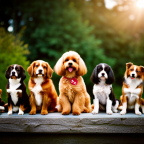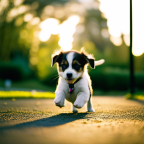- Ancient Civilizations: Unveiling the Names of Dogs From the Distant Past
- Medieval Times: Exploring the Dog Naming Traditions of Old
- Renaissance and Enlightenment: How Society's Influence Shaped Dog Names
- Industrial Revolution to Modern Era: The Evolution of Dog Naming Trends
- Pop Culture and Beyond: Unconventional Dog Names in the Contemporary World
- Frequently Asked Questions
- Conclusion
Click and GO TO THE BEST DOG NAME GENERATOR HERE
Are you curious about how people throughout history have named their dogs?
In this article, we will take you on a journey through the ages, exploring the fascinating world of dog naming.
From the ancient civilizations to the modern era, we will delve into the traditions, influences, and trends that have shaped the names of our beloved four-legged companions.
Get ready to uncover the historical perspective on dog naming and gain a deeper understanding of this age-old practice.
- Ancient Civilizations: Unveiling the Names of Dogs From the Distant Past
- Medieval Times: Exploring the Dog Naming Traditions of Old
- Renaissance and Enlightenment: How Society's Influence Shaped Dog Names
- Industrial Revolution to Modern Era: The Evolution of Dog Naming Trends
- Pop Culture and Beyond: Unconventional Dog Names in the Contemporary World
- Frequently Asked Questions
- Conclusion
Ancient Civilizations: Unveiling the Names of Dogs From the Distant Past
As you explore the rich history of ancient civilizations, you’ll uncover fascinating details about the names bestowed upon dogs in the distant past. Unraveling the mysteries and decoding the symbolism behind ancient dog names allows us to gain insight into the significance of these animals in ancient societies.
Dogs played a crucial role in ancient civilizations, serving not only as loyal companions but also as protectors. The names given to dogs reflected the importance and reverence they held in these ancient cultures. For example, in Egyptian society, dogs were often named after gods and goddesses, reflecting their divine status.
In Mesopotamia, dogs were given names that represented their protective nature, highlighting their role in safeguarding their owners and homes.
Medieval Times: Exploring the Dog Naming Traditions of Old
You can delve into the fascinating world of medieval times by exploring the dog naming traditions of old.
In the feudal hierarchy of the medieval era, social class influenced not only the lives of people, but also the names of their dogs. Dogs owned by nobles and knights were often given regal names, reflecting their high status and importance. On the other hand, commoners often chose more practical and descriptive names for their canine companions.
Additionally, mythological inspirations played a significant role in naming dogs during the medieval era. The use of gods and goddesses in dog names was believed to bestow certain qualities and characteristics upon the animals. Dogs named after mythological figures like Odin, Thor, or Diana were thought to possess strength, courage, or hunting prowess.
Exploring these dog naming traditions provides a unique insight into the social dynamics and beliefs of medieval society.
Renaissance and Enlightenment: How Society’s Influence Shaped Dog Names
Step into the fascinating world of the Renaissance and Enlightenment, where society’s influence shaped the names of dogs. During this era, societal norms played a significant role in the naming of dogs. Dogs were often seen as a symbol of status and wealth, and their names reflected this. Noble families would give their dogs names that reflected their high social standing, such as ‘Prince’ or ‘Duchess’. On the other hand, commoners would give their dogs more simple and practical names, like ‘Spot’ or ‘Rover’.
Literature and art also had a profound influence on dog names during the Renaissance and Enlightenment. Dogs were often depicted in paintings and literature, and their names would reflect the themes and ideas of the time. For example, names like ‘Apollo’ or ‘Minerva’ were popular, as they were associated with the gods and goddesses of Greek and Roman mythology, which were revered during this period.
Industrial Revolution to Modern Era: The Evolution of Dog Naming Trends
During the Industrial Revolution, dog naming trends underwent significant changes as people embraced new ideas and lifestyles. The impact of urbanization on dog naming trends can’t be ignored.
As cities grew and more people moved into urban areas, dogs became more commonly kept as pets rather than working animals. This shift in the role of dogs in society led to a change in how they were named. Gone were the days of simple, descriptive names like ‘Spot’ or ‘Rover.’ Instead, dog owners started giving their pets more elaborate and sometimes whimsical names, reflecting the changing social dynamics of the time.
Additionally, the influence of technological advancements on dog names became apparent. With the rise of technology, people started naming their dogs after famous inventions or technological concepts, such as ‘Pixel’ or ‘Tesla.’ These names not only showcased the owner’s affinity for technology but also highlighted the ever-evolving nature of society.
Pop Culture and Beyond: Unconventional Dog Names in the Contemporary World
In the contemporary world, dogs are being given unconventional names inspired by pop culture and beyond. Influences from social media, particularly Instagram and TikTok, have played a significant role in shaping the current trends in dog naming. These platforms provide a platform for pet owners to showcase their furry friends and share their unique names with a wide audience.
As certain names gain popularity on social media, they start to become more prevalent in real life. Additionally, famous personalities have also influenced dog naming practices. Whether it’s naming your dog after a beloved actor, musician, or athlete, celebrity-inspired dog names have become a common phenomenon. People often look up to their favorite stars and want to emulate them, even when it comes to naming their pets.
Frequently Asked Questions
What Are Some Common Dog Breeds in Ancient Civilizations?
What role did dogs play in ancient civilizations and how did their names reflect this? How did the naming of dogs differ between ancient civilizations and modern times?
How Did Medieval People Choose Names for Their Dogs?
During medieval times, people chose names for their dogs based on superstition and social status. Superstitions influenced the belief that certain names would bring good luck or ward off evil. Social status played a role in selecting names that reflected one’s position in society.
Were Dog Names Influenced by Famous Artists During the Renaissance and Enlightenment?
During the Renaissance and Enlightenment, dog names were influenced by famous artists and philosophers. Greek mythology played a significant role in shaping these names, while philosophers like Descartes and Rousseau also influenced naming trends.
How Did the Industrial Revolution Impact Dog Naming Trends?
During the industrial revolution, the impact of urbanization on dog naming trends was significant. As cities grew, new technological advancements played a role in shaping dog names. This period saw a shift towards more modern and industrial-themed names for dogs.
What Are Some Unconventional Dog Names Inspired by Pop Culture?
Unusual dog names inspired by fictional characters have become increasingly popular due to the influence of social media. From Arya to Dumbledore, pet owners are finding creative ways to pay homage to their favorite pop culture icons.
Conclusion
In conclusion, the history of dog naming reveals a fascinating journey through time. From the ancient civilizations to the medieval times, and from the Renaissance to the modern era, the names given to dogs have been influenced by societal norms and cultural shifts.
As we enter the contemporary world, dog names have become increasingly unconventional, influenced by pop culture and personal preferences. This evolution in dog naming trends reflects the ever-changing nature of society and our deep bond with our furry companions.
- Ancient Civilizations: Unveiling the Names of Dogs From the Distant Past
- Medieval Times: Exploring the Dog Naming Traditions of Old
- Renaissance and Enlightenment: How Society's Influence Shaped Dog Names
- Industrial Revolution to Modern Era: The Evolution of Dog Naming Trends
- Pop Culture and Beyond: Unconventional Dog Names in the Contemporary World
- Frequently Asked Questions
- Conclusion


